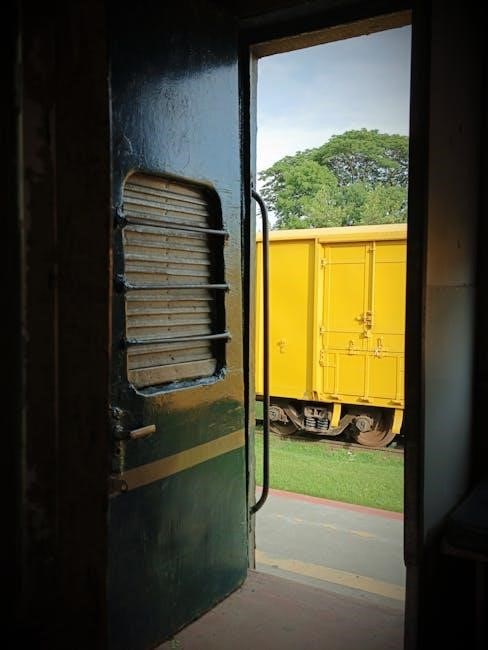Mechanical aptitude tests assess basic mechanical knowledge and problem-solving skills, evaluating how well candidates apply concepts to real-world scenarios. These tests are crucial for roles requiring mechanical expertise and hands-on skills, ensuring candidates can understand and work with tools, machinery, and technical systems effectively.
What Are Mechanical Aptitude Tests?
Mechanical aptitude tests, also known as mechanical reasoning tests, are assessments designed to evaluate an individual’s understanding of basic mechanical principles and their ability to apply these concepts to solve problems. These tests typically include questions about gears, pulleys, levers, thermodynamics, and fluid mechanics, often presented with images and multiple-choice options. They aim to measure problem-solving skills and the ability to analyze mechanical systems in real-world scenarios, making them essential for roles requiring practical mechanical knowledge and hands-on skills. PDF versions of these tests are widely available for practice and preparation.
Importance of Mechanical Aptitude in Job Screening
Mechanical aptitude tests are crucial for identifying candidates with the necessary skills for roles requiring hands-on mechanical expertise. These assessments predict job performance by evaluating problem-solving abilities and understanding of mechanical principles. Employers use them to ensure candidates can safely operate equipment and apply mechanical concepts effectively. Access to PDF resources, such as practice tests and study guides, helps applicants prepare and employers evaluate potential. This structured approach ensures informed hiring decisions, making mechanical aptitude tests indispensable in job screening processes.

Key Concepts Assessed in Mechanical Aptitude Tests
Mechanical aptitude tests evaluate understanding of mechanical principles, problem-solving skills, and the application of concepts like pulley systems, gears, thermodynamics, and fluid mechanics, as detailed in PDF guides.
Mechanical Knowledge and Problem-Solving Skills
Mechanical aptitude tests evaluate candidates’ ability to apply mechanical knowledge and solve practical problems. Questions often involve analyzing pulley systems, gears, and fluid dynamics, requiring logical reasoning and understanding of physical principles. PDF guides and practice tests provide detailed solutions, helping candidates improve their skills in diagnosing mechanical issues and selecting the correct tools for specific tasks. These assessments ensure candidates can handle real-world mechanical challenges effectively, making them essential for roles in engineering and maintenance fields.
Understanding of Basic Mechanical Principles
Mechanical aptitude tests evaluate comprehension of fundamental principles such as motion, forces, and energy. Candidates must grasp concepts like torque, friction, and levers, often through diagrams and multiple-choice questions in PDF formats. Practical examples include pulley systems and gear mechanisms, ensuring candidates understand how mechanical components interact. These questions assess the ability to apply theory to practical scenarios, which is vital for roles requiring hands-on mechanical skills and problem-solving abilities in industrial or engineering environments.
Application of Concepts to Real-World Scenarios
Mechanical aptitude tests challenge candidates to apply theoretical knowledge to practical, real-world problems. For instance, questions may involve calculating mechanical advantage in pulley systems or determining the correct gear ratios for specific tasks. These scenarios mimic on-the-job situations, ensuring candidates can translate their understanding of mechanical principles into actionable solutions. Such application-based questions are crucial for assessing a candidate’s readiness to handle technical challenges in machinery operation, maintenance, and engineering roles, as highlighted in various PDF resources and practice tests.

Types of Mechanical Aptitude Tests
Common types include the Wiesen, Ramsay, and Bennett tests, each assessing mechanical knowledge, problem-solving, and practical application skills in diverse industrial and engineering contexts.
Wiesen Mechanical Aptitude Test
The Wiesen Mechanical Aptitude Test is a widely used assessment tool designed to evaluate mechanical reasoning and problem-solving abilities. It typically consists of multiple-choice questions that cover basic mechanical principles, such as gears, pulleys, levers, and fluid mechanics. The test is timed, with a standard format that includes visual diagrams and scenarios to measure practical application skills. It is commonly administered to predict job performance in roles requiring hands-on mechanical expertise and is particularly popular in industries like manufacturing and engineering.
Ramsay Mechanical Aptitude Test
The Ramsay Mechanical Aptitude Test is a popular assessment tool used to measure mechanical reasoning and problem-solving skills. It features multiple-choice questions that focus on basic mechanical principles, such as gears, levers, and pulley systems. The test is designed to evaluate how well candidates can apply theoretical knowledge to practical scenarios. With a timed format, it is widely used in industries requiring mechanical aptitude, such as engineering and manufacturing, to identify candidates with strong technical and analytical abilities.
Bennett Mechanical Aptitude Test
The Bennett Mechanical Aptitude Test evaluates mechanical reasoning and problem-solving abilities. It includes questions on gears, pulleys, and levers, assessing how well candidates apply mechanical principles to real-world scenarios. The test is timed and consists of 70 questions, providing detailed solutions in its paid version. It is widely used in industries requiring mechanical aptitude, such as engineering and manufacturing, to identify candidates with strong technical and analytical skills, ensuring they can handle tools and machinery effectively. This test is a valuable tool for screening applicants in mechanically demanding roles.

Preparing for Mechanical Aptitude Tests
Effective preparation involves studying mechanical concepts, practicing with sample tests, and understanding test formats. Focus on problem-solving, time management, and familiarizing yourself with common question types.
Study Materials and Resources
Various study materials, including downloadable PDFs, offer practice questions, detailed solutions, and guides for mechanical aptitude tests. Resources cover topics like gears, pulley systems, and thermodynamics, providing insights into common test formats. Many PDF files include sample questions and answers, enabling candidates to familiarize themselves with test structures and improve problem-solving skills. Additionally, apps and books, such as the Bennet Mechanical Aptitude Test guide, are recommended for comprehensive preparation. These resources are essential for understanding mechanical principles and excelling in job-specific aptitude assessments.
Practice Tests and Question Banks
Practice tests and question banks are essential for preparing for mechanical aptitude tests. Many resources, including downloadable PDFs, offer realistic test simulations with multiple-choice questions covering gears, pulley systems, and thermodynamics. These materials often include detailed solutions and explanations, helping candidates understand their mistakes. Online platforms and apps, like the Bennet Mechanical Aptitude Test app, provide timed practice sessions to familiarize candidates with test formats. Regular practice with these tools improves problem-solving skills and overall test readiness, ensuring better performance in actual assessments.

Understanding Test Formats and Time Limits
Mechanical aptitude tests typically feature multiple-choice questions with images, assessing problem-solving and mechanical knowledge. Many tests are timed, such as a 30-minute exam with 60 items, requiring efficient thinking. Understanding the format beforehand helps candidates manage their time effectively. Familiarizing oneself with the test structure, such as question types and visual aids, reduces anxiety and improves performance. Practicing with timed sessions from PDF resources or apps ensures candidates can handle the pressure and complete the test within the allotted time, maximizing their scores and confidence.

Common Question Types in Mechanical Aptitude Tests
Questions often involve pulley systems, gears, thermodynamics, and fluid mechanics. They typically include diagrams and multiple-choice options, testing problem-solving and practical application skills effectively.
Mechanical Advantage and Pulley Systems
Mechanical advantage measures the ratio of output force to input force, crucial in engineering applications. Pulley systems, often tested, involve calculating tension and effort required to lift loads. Simple pulleys change the direction of force, while compound pulleys alter both direction and magnitude. Questions typically present diagrams of pulley setups, asking for the mechanical advantage or the force needed to move an object. Understanding friction, weights, and rope segments is essential. Practice tests often include problems where candidates must apply these principles to determine unknown forces or distances, ensuring practical problem-solving skills are assessed effectively.
Thermodynamics and Fluid Mechanics Basics
Thermodynamics involves understanding energy transfer, temperature, and pressure relationships, while fluid mechanics explores the behavior of liquids and gases under various conditions. Questions often focus on principles like energy conservation, heat transfer, and fluid dynamics. Candidates may be asked to calculate pressure differences or determine fluid flow rates. These concepts are fundamental in mechanical systems, ensuring efficient design and operation. Practice tests frequently include problems requiring the application of these principles to real-world scenarios, testing both theoretical knowledge and practical problem-solving abilities effectively.
Gear and Lever Systems
Gear and lever systems are essential components in mechanical aptitude tests, assessing understanding of torque, speed, and force transmission. Questions often involve calculating gear ratios, determining mechanical advantage, and analyzing the efficiency of lever systems. These concepts are critical in machinery design and operation. Practice tests include scenarios where candidates must apply these principles to solve problems, ensuring they can handle practical mechanical challenges effectively and efficiently in real-world applications.

Free PDF Resources for Mechanical Aptitude Tests
Downloadable PDFs offer practice tests, answer sheets, and detailed solutions for Wiesen, Ramsay, and Bennett tests. These resources provide comprehensive study guides and sample questions.
Downloadable Practice Tests
Downloadable practice tests for mechanical aptitude are available in PDF format, offering realistic question sets. These tests cover topics like gears, pulleys, and thermodynamics, mirroring actual exam structures. They include answer keys and detailed explanations to help candidates improve their problem-solving skills. Popular tests like Wiesen, Ramsay, and Bennett are often featured, providing candidates with hands-on experience. Regular practice with these resources enhances mechanical reasoning and boosts confidence for job assessments or entrance exams. Utilizing these tools ensures comprehensive preparation and familiarization with test formats.
Answer Sheets and Detailed Solutions
Answer sheets and detailed solutions are essential resources for mechanical aptitude test preparation. They provide correct answers to practice questions, along with step-by-step explanations to help candidates understand their mistakes. Many PDF guides include solutions for popular tests like Wiesen, Ramsay, and Bennett, ensuring comprehensive understanding. These resources also cover a wide range of topics, from basic mechanical principles to complex problem-solving scenarios. By reviewing detailed solutions, candidates can identify weak areas, improve their problem-solving strategies, and enhance their overall performance in timed assessments.
Guides for Further Study
Guides for further study provide in-depth resources to enhance mechanical aptitude skills. Books like Engineering Mechanics by N.P. Bali and Arco Mechanical Aptitude and Spatial Relations Test offer comprehensive coverage of mechanical principles. Additionally, websites and apps like JobTestPrep and Bennet Mechanical Test Practice provide detailed explanations and practice materials. These guides are tailored for candidates seeking to improve their understanding of mechanical concepts, such as pulley systems, thermodynamics, and gear mechanisms. They are invaluable for advancing problem-solving abilities and preparing for advanced mechanical aptitude assessments. Regular use ensures a strong foundation and improved test performance.



